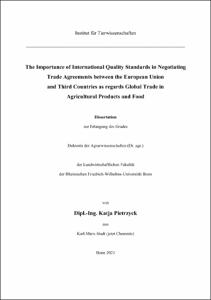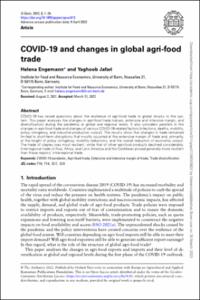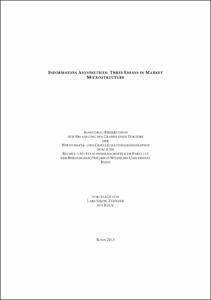Pietrzyck, Katja: The Importance of International Quality Standards in Negotiating Trade Agreements between the European Union and Third Countries as regards Global Trade in Agricultural Products and Food. - Bonn, 2023. - Dissertation, Rheinische Friedrich-Wilhelms-Universität Bonn.
Online-Ausgabe in bonndoc: https://nbn-resolving.org/urn:nbn:de:hbz:5-73351
Online-Ausgabe in bonndoc: https://nbn-resolving.org/urn:nbn:de:hbz:5-73351
@phdthesis{handle:20.500.11811/11181,
urn: https://nbn-resolving.org/urn:nbn:de:hbz:5-73351,
doi: https://doi.org/10.48565/bonndoc-178,
author = {{Katja Pietrzyck}},
title = {The Importance of International Quality Standards in Negotiating Trade Agreements between the European Union and Third Countries as regards Global Trade in Agricultural Products and Food},
school = {Rheinische Friedrich-Wilhelms-Universität Bonn},
year = 2023,
month = dec,
note = {The aim of this thesis is to assess the role of international quality standards in context of free trade agreements, taking into account international supply chains and global value chains. An intensive literature review revealed that quality standards imply a close link between trade and resilient supply chains.
Not only traditional governmental trade barriers, but also increasingly trade policy measures by industry influence the extent to which demands from industry standards play a role for trade in agricultural products and food. Comprehensive trade agreements negotiated by the European Union (EU) in recent decades not only eliminate tariffs, but also prescribe a wide range of political measures. They provide a framework for quality management and related international standard setting. Therefore, in the context of free trade agreements, the importance of international quality standards in the agri-food sector is growing.
My own empirical studies refer to three concrete fields of action: I. quality management in companies of the agri-food industry, II. communication in food supply chains, III. reduction of trade barriers in global trade with agricultural products and food. All three fields of action are considered in terms of their mutual influence and under the aspect of sustainability as a quality characteristic. For this purpose, seven empirical sub-studies were conducted between the years 2015 and 2022 and the different methodological approaches as well as the results were published in scientific journals. The publications are framed by an introduction describing the changes in the framework conditions for global trade and a discussion that takes into account the multiple crisis situation since 2020. The results are based on five qualitative surveys and expert interviews with more than 200 participants from the EU and the USA as well as an extensive media analysis.
The four most important results of the expert interviews are: I. the sustainability field of action is considered by the experts to be one of the most current and urgent quality features in global trade, II. according to the assessment of experts, effective traceability, as aimed at by the EU´s Farm-to-Fork strategy, will only succeed in quality management, if all companies within the value chain recognize the same quality characteristics (for example, animal welfare, GMO-free, CO2 reduction) as a joint effort and pursue them with determination, III. experts believe that global trade requires a unified vision and well-organized quality infrastructure in importing and exporting countries, IV. for the three fields of action (inter-company quality management, digital communication and reduction of trade barriers), the experts suggest targeted training and further education measures for responsible players as well as the establishment of quality management networks as purposeful actions. The concluding chapter of the thesis addresses several research questions that remain open and which should be answered in follow-up studies.},
url = {https://hdl.handle.net/20.500.11811/11181}
}
urn: https://nbn-resolving.org/urn:nbn:de:hbz:5-73351,
doi: https://doi.org/10.48565/bonndoc-178,
author = {{Katja Pietrzyck}},
title = {The Importance of International Quality Standards in Negotiating Trade Agreements between the European Union and Third Countries as regards Global Trade in Agricultural Products and Food},
school = {Rheinische Friedrich-Wilhelms-Universität Bonn},
year = 2023,
month = dec,
note = {The aim of this thesis is to assess the role of international quality standards in context of free trade agreements, taking into account international supply chains and global value chains. An intensive literature review revealed that quality standards imply a close link between trade and resilient supply chains.
Not only traditional governmental trade barriers, but also increasingly trade policy measures by industry influence the extent to which demands from industry standards play a role for trade in agricultural products and food. Comprehensive trade agreements negotiated by the European Union (EU) in recent decades not only eliminate tariffs, but also prescribe a wide range of political measures. They provide a framework for quality management and related international standard setting. Therefore, in the context of free trade agreements, the importance of international quality standards in the agri-food sector is growing.
My own empirical studies refer to three concrete fields of action: I. quality management in companies of the agri-food industry, II. communication in food supply chains, III. reduction of trade barriers in global trade with agricultural products and food. All three fields of action are considered in terms of their mutual influence and under the aspect of sustainability as a quality characteristic. For this purpose, seven empirical sub-studies were conducted between the years 2015 and 2022 and the different methodological approaches as well as the results were published in scientific journals. The publications are framed by an introduction describing the changes in the framework conditions for global trade and a discussion that takes into account the multiple crisis situation since 2020. The results are based on five qualitative surveys and expert interviews with more than 200 participants from the EU and the USA as well as an extensive media analysis.
The four most important results of the expert interviews are: I. the sustainability field of action is considered by the experts to be one of the most current and urgent quality features in global trade, II. according to the assessment of experts, effective traceability, as aimed at by the EU´s Farm-to-Fork strategy, will only succeed in quality management, if all companies within the value chain recognize the same quality characteristics (for example, animal welfare, GMO-free, CO2 reduction) as a joint effort and pursue them with determination, III. experts believe that global trade requires a unified vision and well-organized quality infrastructure in importing and exporting countries, IV. for the three fields of action (inter-company quality management, digital communication and reduction of trade barriers), the experts suggest targeted training and further education measures for responsible players as well as the establishment of quality management networks as purposeful actions. The concluding chapter of the thesis addresses several research questions that remain open and which should be answered in follow-up studies.},
url = {https://hdl.handle.net/20.500.11811/11181}
}









